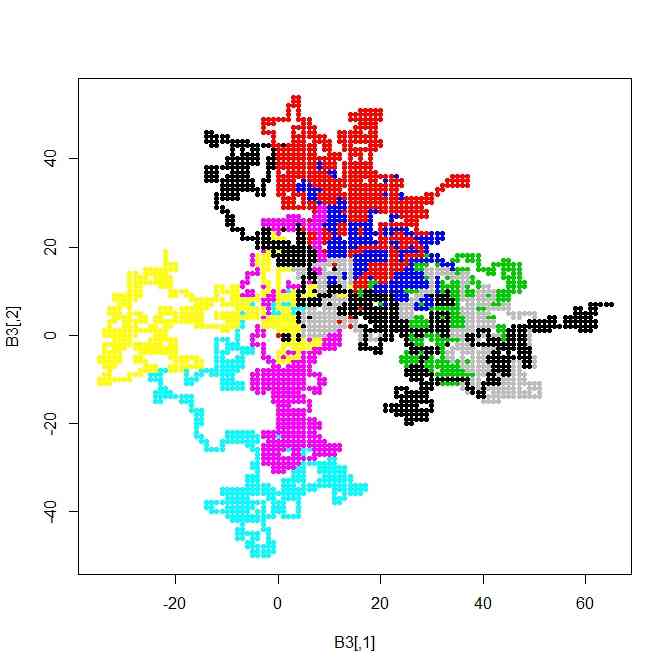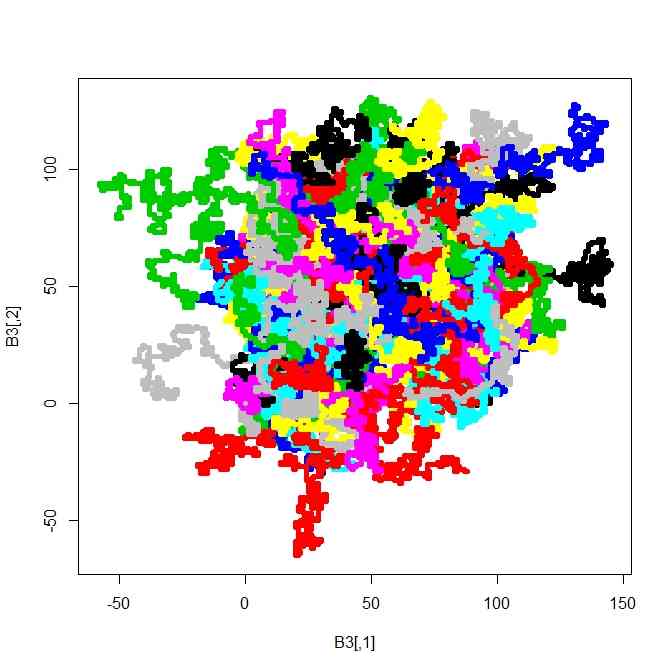- こちらでself-avoiding pathを書いてみた。データ型宣言も体系的に勉強せずに、みようみまね、検索・検索真似で書いているので、なかなか大変
- コンパイルはするけれど、データ格納場所(アドレス)指定の破たんなどが頻発するので、しょっちゅう止まります
- そうはいっても、少し前進したいので、複数のagentsがいて、相互に自身のいた場所も他agentのいた場所も避けるような酔歩にしてみる
- さらに、通ってはいけないのは、有限の過去までの居場所であって、ある時間が経過したらそこは通れるようにしてみる


#include <RcppArmadilloExtensions/sample.h>
using namespace Rcpp ;
using namespace Rcpp;
IntegerMatrix selfAvoidingPathCpp2_multi(int k,int past,int n,int L,int t,int maxt) {
IntegerMatrix x(t,k*n);
for(int i=0;i<(k*n);++i){
for(int j=0;j<t;++j){
x(j,i) = 0;
}
}
IntegerVector p = seq_len(L);
IntegerVector p2 = RcppArmadillo::sample(p, k*n, TRUE);
for(int i=0;i<k*n;++i){
x(0,i) = p2[i];
}
RNGScope scope;
IntegerVector kv = seq_len(k);
IntegerVector s(2);
s[0] = -1;
s[1] = 1;
IntegerMatrix rm(maxt,n);
IntegerMatrix rsm(maxt,n);
for(int i=0;i<n;++i){
IntegerVector r = RcppArmadillo::sample(kv, maxt, TRUE);
IntegerVector rs = RcppArmadillo::sample(s, maxt, TRUE);
for(int j=0;j<maxt;++j){
rm(j,i) = r[j];
rsm(j,i) = rs[j];
}
}
int cnt = 0;
for(int i=0;i<maxt;++i){
if(cnt==t-2){
break;
}
for(int ii=0;ii<n;++ii){
int start = ii*k;
int end = (ii+1)*k-1;
IntegerVector here(k);
for(int j=0;j<k;++j){
here[j] = x(cnt,j+start);
}
IntegerVector toward(k);
for(int j=0;j<k;++j){
toward[j] = here[j];
}
toward[rm(i,ii)-1] = toward[rm(i,ii)-1]+rsm(i,ii);
if(past == 0){
for(int j=0;j<k;++j){
x(cnt+1,j+start) = toward[j];
}
}else{
int tmppast = 0;
if(past == -1){
}else{
int tmp2 =cnt-past;
if(tmppast<tmp2){
tmppast = tmp2;
}
}
bool b = TRUE;
for(int jj=0;jj<n;++jj){
int st2 = jj*k;
int end2 = (jj+1)*k-1;
for(int j=tmppast;j<cnt+1;++j){
bool b2 = TRUE;
for(int jjj=0;jjj<k;++jjj){
if(x(j,jjj+st2) != toward[jjj]){
b2 = FALSE;
break;
}
}
if(b2){
b = FALSE;
break;
}
}
if(!b){
break;
}
}
if(b){
for(int j=0;j<k;++j){
x(cnt+1,j+start) = toward[j];
}
}else{
for(int j=0;j<k;++j){
x(cnt+1,j+start) = here[j];
}
}
}
}
++cnt;
}
IntegerMatrix newx(t,k*n);
for(int i=0;i<t;++i){
for(int j=0;j<k*n;++j){
newx(i,j) = x(i,j);
}
}
return newx;
}
library(Rcpp)
library(RcppArmadillo)
library(rgl)
sourceCpp("selfAvoidingPathCpp2_multi.cpp")
k<-2
n<-10
max.t<-10000
past <- 20
t <- 1000
L <- 20
B2 <- selfAvoidingPathCpp2_multi(k,past,n,L,t,max.t)
B3 <- B2[,1:k]
for(i in 2:n){
B3 <- rbind(B3,B2[,(1+(i-1)*k):(i*k)])
}
col <- rep(1:n,each=t)
plot(B3,col=col,pch=20,cex=1)

